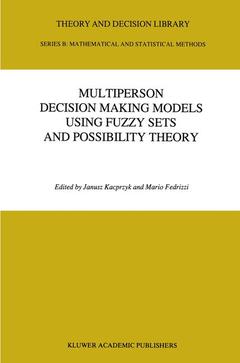Multiperson Decision Making Models Using Fuzzy Sets and Possibility Theory, Softcover reprint of the original 1st ed. 1990 Theory and Decision Library B Series, Vol. 18
Langue : Anglais
Coordonnateurs : Kacprzyk J., Fedrizzi Mario

Decision making is certainly a very crucial component of many human activities. It is, therefore, not surprising that models of decisions play a very important role not only in decision theory but also in areas such as operations Research, Management science, social Psychology etc . . The basic model of a decision in classical normative decision theory has very little in common with real decision making: It portrays a decision as a clear-cut act of choice, performed by one individual decision maker and in which states of nature, possible actions, results and preferences are well and crisply defined. The only compo nent in which uncertainty is permitted is the occurence of the different states of nature, for which probabilistic descriptions are allowed. These probabilities are generally assumed to be known numerically, i. e. as single probabili ties or as probability distribution functions. Extensions of this basic model can primarily be conceived in three directions: 1. Rather than a single decision maker there are several decision makers involved. This has lead to the areas of game theory, team theory and group decision theory. 2. The preference or utility function is not single valued but rather vector valued. This extension is considered in multiattribute utility theory and in multicritieria analysis. 3.
1. Introductory Sections.- Multiperson Decision Making: a Selective Review.- Fuzzy Set Theory as a Theory of Vagueness.- Vague Notions in the Theory of Voting.- 2. General Issues Related to Decision Making under Fuzziness.- Aggregation of Possibility Measures.- Modelling Valued Preference Relations.- Revealed Fuzzy Preferences.- Categories of Fuzzy Relations in Decision Making.- Determination and Interpretation of the Fuzzy Utility of an Act in an Uncertain Environment.- Extending Aggregation Operators for Multicriteria Decision Making.- Ranking Alternatives by Weak Transitivity Relations.- Calculating the Mean Knowledge Representation from Multiple Experts.- An Approach to Customized End-User Views in Multi-User Information Retrieval Systems.- 3. Group Decision Making under Fuzziness.- Means and Social Welfare Functions in Fuzzy Binary Relation Spaces.- Aggregation of Fuzzy Preferences.- Single — Peakedness in Weighted Aggregation of Fuzzy Opinions in a Fuzzy Group.- On Group Decision Making under Fuzzy Preferences.- Group Decision Making with Fuzzy and Non-Fuzzy Evaluations.- On Construction of the Fuzzy Multiattribute Risk Function for Group Decision Making.- Consensus Measures for Qualitative Order Relations.- On a Consensus Measure in a Group MCDM Problem.- Voting Procedures with a priori Incomplete Individual Profiles.- 4. Team Decision Making under Fuzziness.- A Team Decision Making Model for Distributed Problem Solving.- Evidential Teams.- 5. Fuzzy Games.- Fuzzy Goals and Sets of Choices in Two-Person Games.- Playing Matrix Games Defined by Linguistic Labels.- Fuzzy Convexity and Peripherial Core of an Exchange Economy Represented as a Fuzzy Game.- Fuzzy Sequencing Games.
Date de parution : 09-2011
Ouvrage de 346 p.
15.5x23.5 cm
Thème de Multiperson Decision Making Models Using Fuzzy Sets and... :
Mots-clés :
Change; decision making; economy; fuzzy games; fuzzy sets; modeling
© 2024 LAVOISIER S.A.S.
